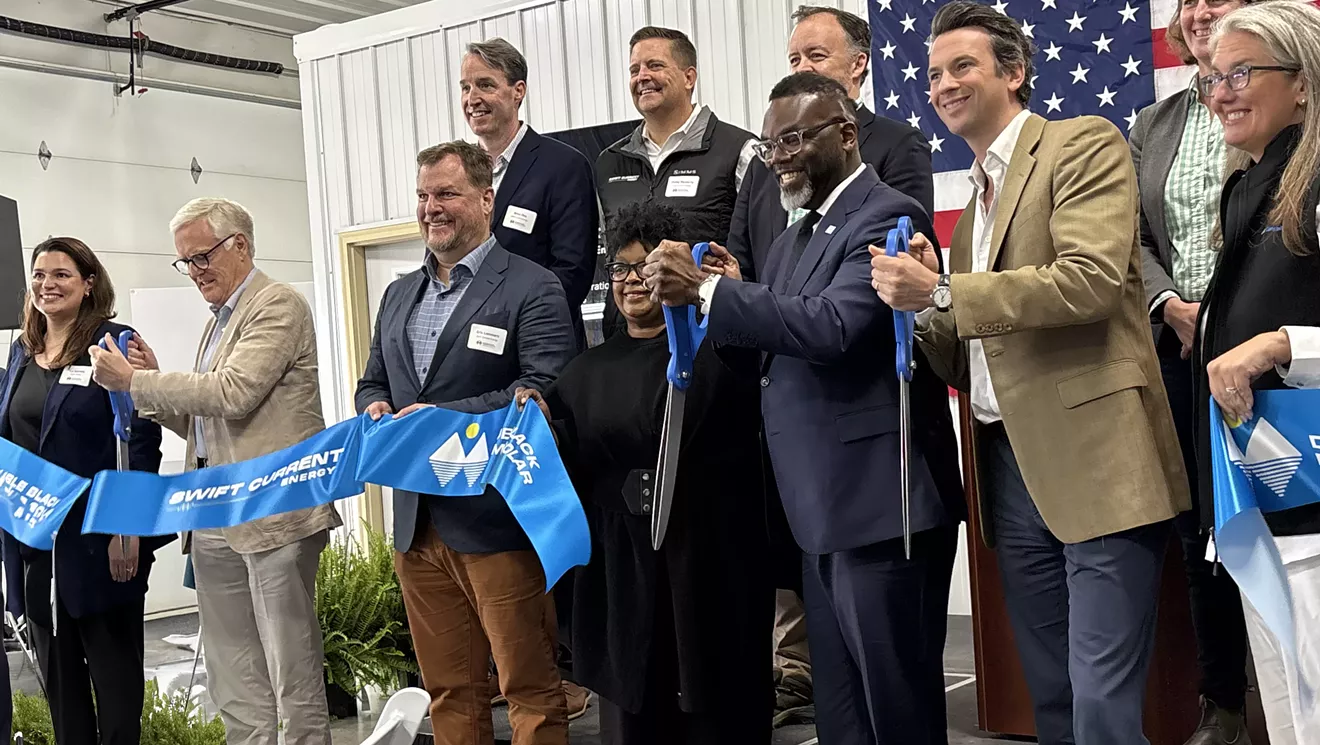
PHOTO COURTESY SPRINGFIELD SANGAMON GROWTH ALLIANCE
Sangamon County Board Chair Andy Van Meter, second from left, joins other dignitaries to cut the ribbon celebrating the opening of the Double Black Diamond Solar farm, headquartered in Auburn.
Sangamon County is now home to the largest solar power
development east of the Mississippi River.
On April 30, Swift
Current Energy, a Boston-based firm, held a ribbon-cutting at its Auburn office
for the Double Black Diamond solar farm.
The collection of
solar panels was erected on more than 4,000 acres in western Sangamon County
and eastern Morgan County
“Construction was
completed Dec. 31, 2024, after over two-and-a-half years of construction,” said
Ryan McCrady, president of the Springfield Sangamon Growth Alliance. “It’s important for our community for a number
of reasons. It helps diversify the portfolio of energy assets that we have
across the county having solar or renewable energy available. It’s important to
businesses that hope to access that kind of energy to meet many of their goals that
are important to them and their shareholders.
“Also, the job was
constructed using local labor. Five hundred construction jobs were created
during the construction lifetime of the project,” he said.
The farm generates
800 megawatts, which is enough power to supply more than 100,000 homes. Previously,
the land was used to grow corn and soybeans.
The congressional
district of U.S. Rep. Mary Miller, R-Oakland, encompasses the Double Black
Diamond solar farm but she is one of the most outspoken critics of solar power
in Congress.
Last month, in a
speech in the House of Representatives, she said, “As a family farmer, I am
very concerned with America’s prime farmland being covered with taxpayer-subsidized
solar-panel installations. Food security is national security, and if we cover
our farm ground with Chinese solar panels, we will become dependent on foreign
adversaries for food.”
Miller also
expressed concerns about potential health hazards.
“According to the
EPA, solar panels contain hazardous waste that can be harmful to human health. That
is why we should be alarmed by the increasing number of solar panels being
installed on our most fertile farmland, especially when the federal government
is handing out tax credits for it,” she said.
Solar power is
increasingly being embraced as an alternative to fossil fuels, which scientists
contend is linked to climate change. However, many far-right Republicans reject
the research on climate change, including Miller.
In an interview last
month with podcaster Amanda Radke, Miller said, “It’s a sham. The whole climate
change is a sham. First of all, God controls the climate because he controls
the sun, and the sun controls the weather primarily.”
Miller’s office
did not respond to a request from Illinois Times for clarification on
her position.
McCrady noted that
agriculture is facing challenges because it is producing too much – not too
little.
“I’m proud to live
in the country that represents personal property rights,” he said. “These
renewable projects are not eminent domain projects. So, absent a willing and
participating landowner, they just don’t happen. … The profitability of traditional grain
farming is challenged right now. And individuals who own land, I believe,
should have a right to seek other models for extracting the value out of that
land. Preserving farming in our country is important. But I think it’s also
safe to say that we produce more of the product than we can consume here.”
About 70% of
agricultural land in Illinois is leased by farmers.
Creating
alternative uses for farmland gives more options for landowners but places
pressure on tenant farmers, said Bill Bodine, director of business and
regulatory affairs for the Illinois Farm Bureau.
“For
some farmers, it’s a challenge, because they need access to land in order to
continue their business, to make a profit, to support their families. Sometimes
there can be concerns with conversion of farmland simply because it’s a
competing use.”
He
said the Farm Bureau does not take a stand on individual projects such as
Double Black Diamond. While the organization prefers to see marginal farmland used
rather than prime farmland to host solar developments, ultimately it supports
the right of landowners to determine the best use of their property, he said.
Sangamon
County Board Chair Andy VanMeter called the project consequential for several
reasons.
“It
means $1 million dollars of tax revenue in the first year for the taxing bodies
in this area,” he said. “About $300,000
of that will go to Sangamon County. About $600,000 will go to the school
districts down there. And the balance goes to the other local taxing bodies.
“It
also means 18 very high-paying jobs maintaining the facility. And more
generally, I hope it means to the larger development community that Sangamon
County is open for business and that we’re a good place for new businesses to
locate.”
The
Double Black Diamond project is expected to generate more than $100 million in
local property tax revenues during the next 35 years, Van Meter said.
Several
Chicago-area entities are sourcing power from the project, including Loyola
University, CVS Health and the city of Chicago.
”There’s
some question as to if the city of Chicago is buying the power, how does it
benefit Sangamon County?” McCrady said. “I think this is a really good example
of how two communities located a long distance apart in a state that’s
geographically very large can work together and actually do things that benefit
both of them.
“The
energy is being purchased up in the Chicago area. However, our folks got to
build the project. The energy center exists in our community, so we get the
property taxes from it and the ongoing economic benefit of it. The people in
Chicago are able to achieve their renewable energy goals that they need. I think it’s an example of how we don’t have
to compete with Chicago to do things that are good for our state’s economy,”
McCrady said.


